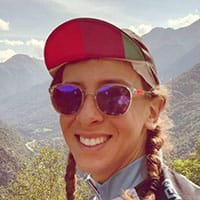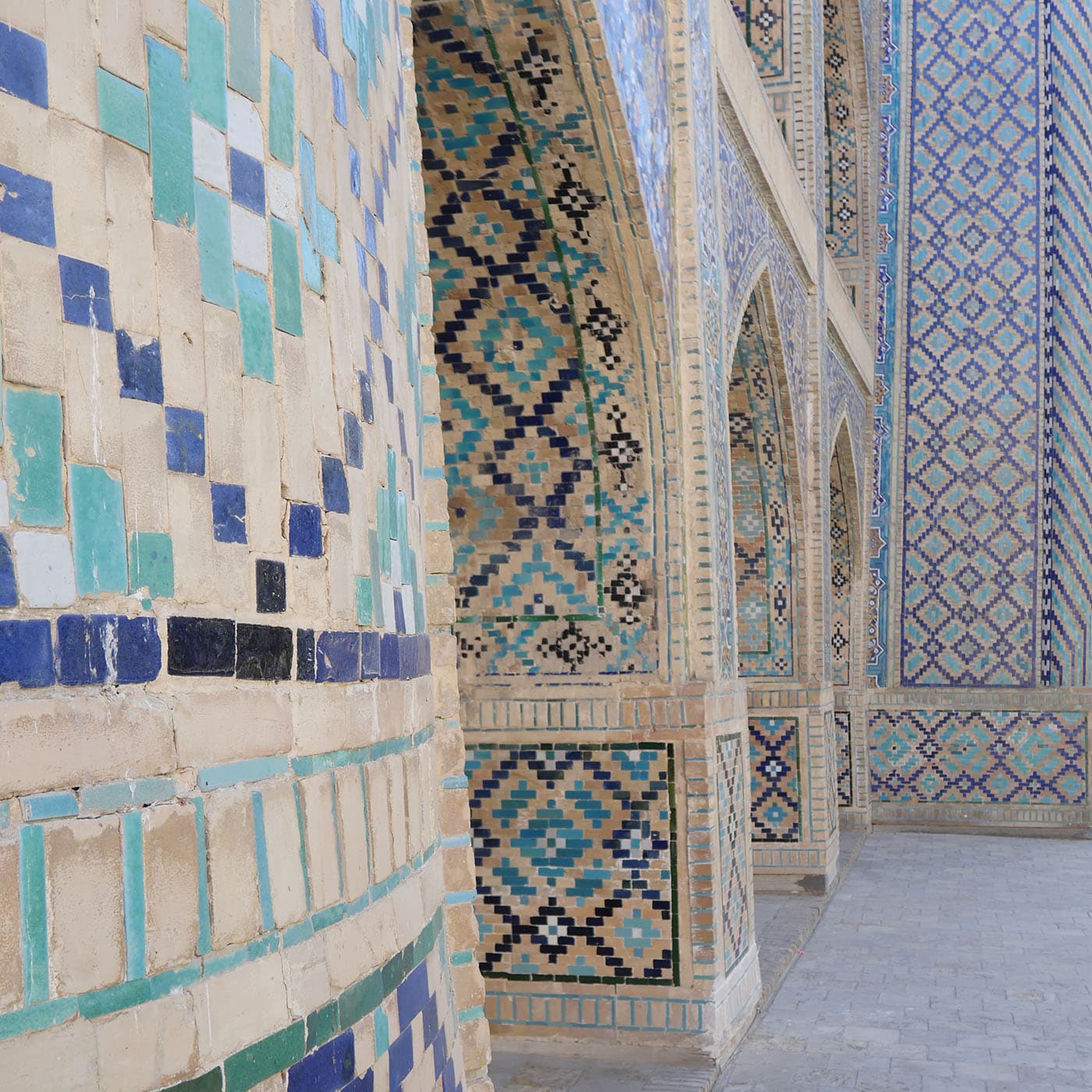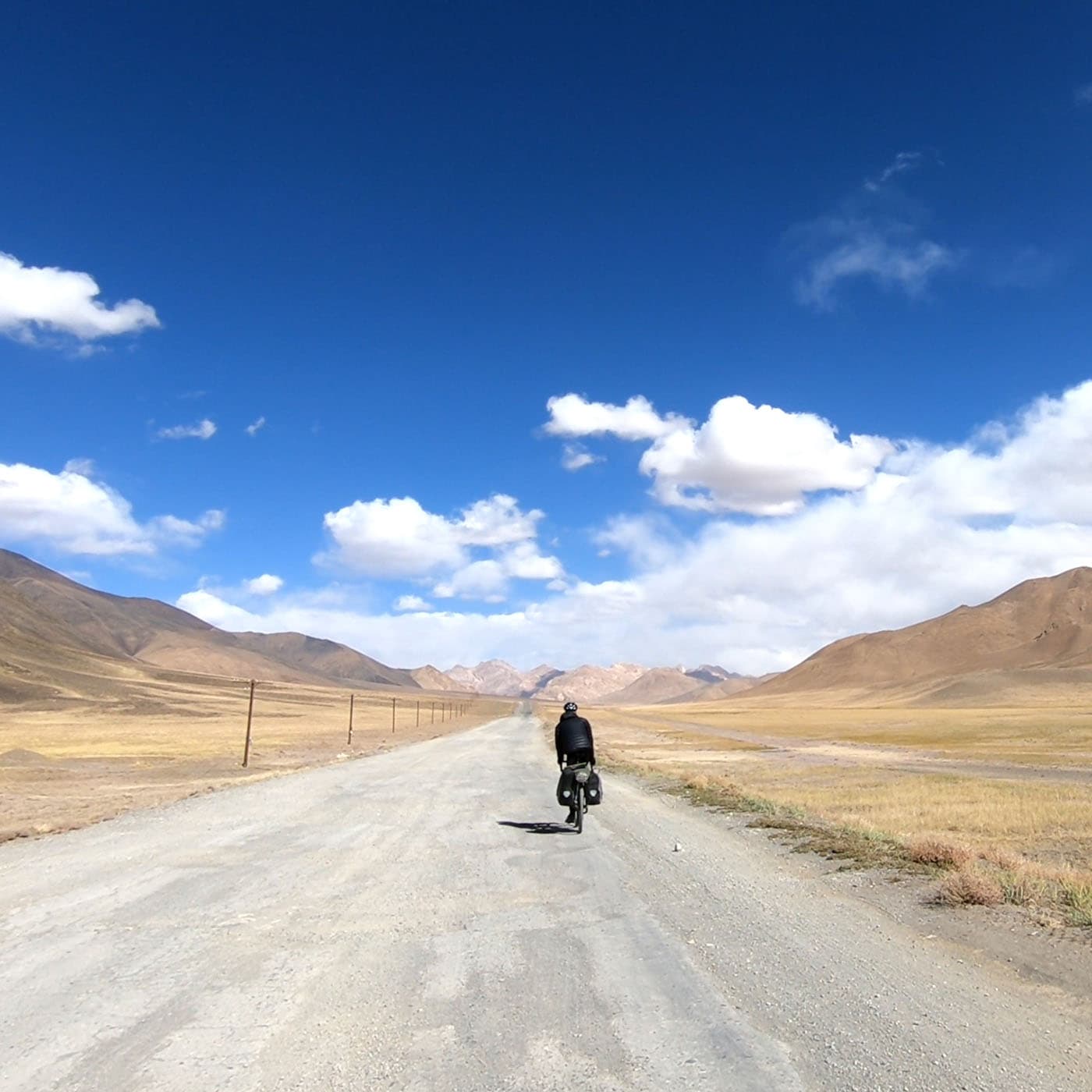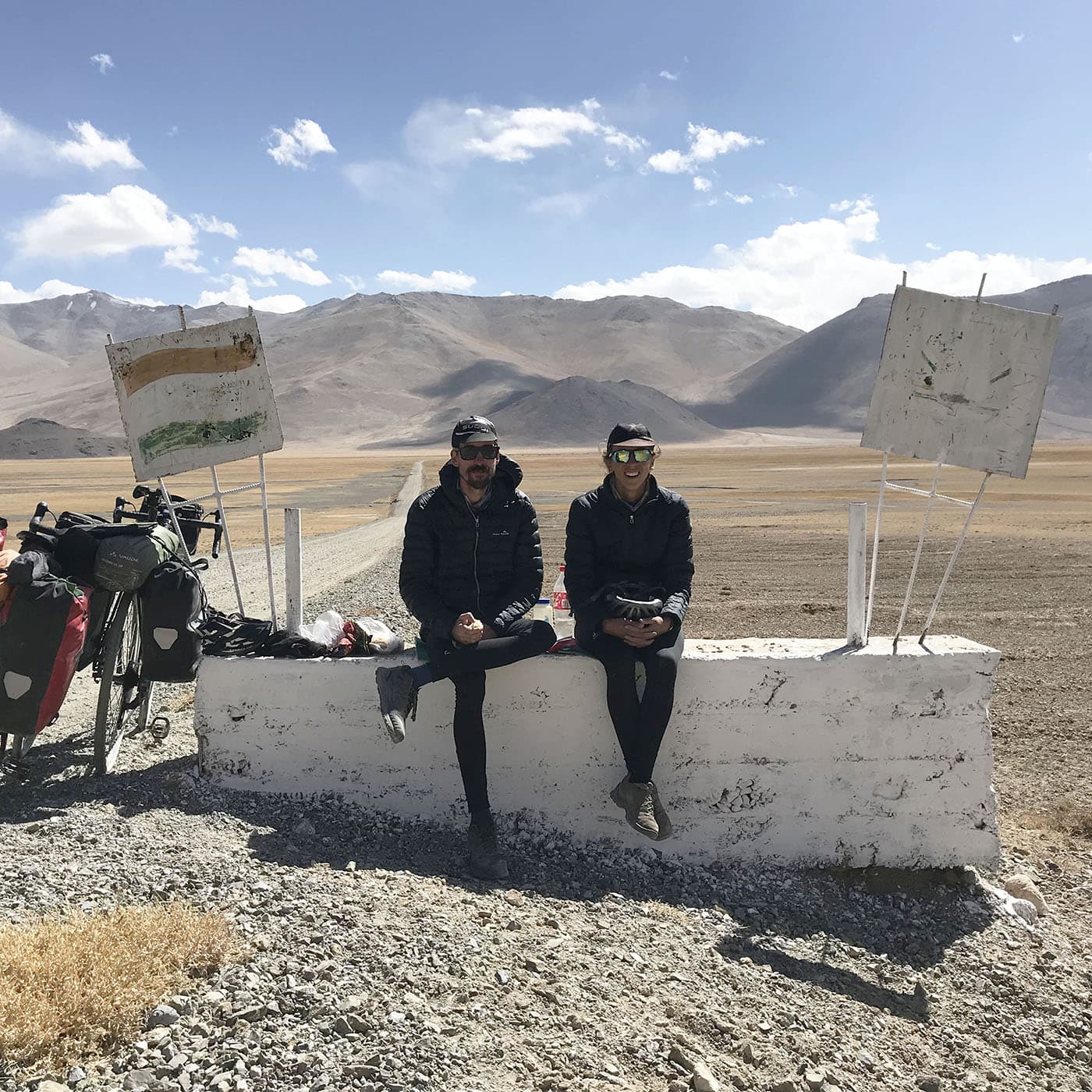
September 2018 - Worldtrip Update
Before we started our bike trip, I had vague notions of places such as the Silk Road, the Pamir Mountains, and China. I did not believe I could reach them by bicycle. This article is about how places I fantasised about became real impressions and experiences.
From Bukhara to Samarkand
In the early morning, the train brought us to Bukhara, an important city on the Silk Road and the start of our journey through Central Asia.
As we arrived in the city, we sat on a bench in the shade in one of the beautiful gardens. From here we went on wandering through the city to enjoy the masonry of older times. Facades and buildings ornamented in blueish mosaics and massive walls of yellow bricks attracted us in the heat. Architecture and urban structures are well preserved and imposing as ever, they really made us feel the times of camel caravans, bazaars, caravanserais and artisans. As travelers and “tyro nomads” we felt right at home.

The acquaintances we made during our lunch break in the garden testify to the liveliness of Bukhara. First, a girl came to us waiting in the garden to drive children of tourists around in a remote-controlled car. She told us, for a 12-year-old good English, that she is currently speaking or learning 5 languages: Uzbek, Tajik, Azerbaijani, Turkish and English. She wanted to become a tourist guide and then a doctor.
Later a city guide, passers-by and some tourists came to us with interest. So we just sat there and had little conversations, our trip was always the beginning and the center of the conversation.
Later on we proved to the friendly waiter in the restaurant that we could also eat the quantities of food we ordered. We paid with a stack of so’m from our pockets (1 so’m = about 0.00011 €), and then made our way out of the city.
The trip went on through agricultural areas. In the mornings we woke up early with the cows, camped in fields and took long lunch breaks to escape the heat during the day. We met a lot of kids on the streets yelling at us and chasing after us by foot, bike or donkey, we gifted them sweets for their entertainment. These kids were all very polite, cute and all wanted selfies with us. At lunchtime, they often spotted us and wanted to either show us their bikes, practice their English, or just watch what the hell these two aliens are doing. Yves often showed them our gear and let them play around with the GoPro, which really amused them.
The intensive agriculture made it sometimes hard for us to find a good place to sleep. Especially the massive, state-owned cotton plantations are often guarded, so we slept in places like school playgrounds.
In Uzbekistan, the scarcity of some goods began, drinking water was no longer coming from the tap, instead we had to filter or buy it. Gasoline for our stove did not really exist, the government promotes gas and so all vehicles are gas-powered. To our advantage, despite a lot of old cars on the roads, the air quality was good and not smelly.
The children were not the only ones who welcomed us very warmly. Motorists often stopped and gave us fresh Samarkand bread or apples out of car windows.
Shortly before Samarkand, people once again proved their hospitality. With the ulterior motive, perhaps to be allowed to camp in the garden of a beautiful mosque, we stepped through the entrance gate. Walked up to three men who were busy with gardening, and asked them if we could pitch our tent here for one night. We were immediatly offered a reading room of the mosque as a place to sleep. But before we could take of our luggage, one of the men took us into his garden, where his wife, sister-in-law and grandson sat at the coffee table. It became rapidly clear that Malik wanted to invite us to stay with him. The sister-in-law, Julduz, works for the Indian Embassy in Tashkent and speaks fluent English, until then we communicated with hands and feet with the teachers couple. And then it all started: After they served us tea and delicious nectarines, melons and grapes from the garden, the evening went on with a selection of sweet pastries and then a delicious vegetarian potato stew. The whole eatery was topped in the morning by breakfast, which Rano had prepared before work. I’ll just say: pancakes, cherry jam, tea, and fresh milk from the cows in the garden.
Before we left, Yves played football one last time with the 3-year-old grandchild Ali. We were given kilos of fruits, and then we went for a half-day ride to Samarkand.

Samarkand welcomed us with wide roads and lots of traffic. The city is modern and there were a lot of tourists from all over, old structures are superimposed with modern squares and tall houses. We visited the sights rather quickly, smuggled ourselves through back entrances into the palaces and roamed old town streets. We stayed in a sympathetic hotel, it had a beautifully landscaped courtyard and a shadowy roof terrace where we spent most of our time and drank light delicious tea.
Yves digestion had not been good for a while. We are grateful that the son of the hotelier accompanied us to the hospital around the corner. We were only there for about 10 minutes: one minute waiting for a doctor, three minutes questioning and examination, two minutes walk to the hospital’s own pharmacy, four minutes for the pharmacist to translate the prescription and explaine the effect of the medicine. Boom.
We spent the last night in Uzbekistan in a village just at the border with Tajikistan in the home of the local mayor. He had collected us at the primary school, where we wanted to pitch our tent.
He had his wife and daughter make us food, introduced us to his sons, and showed us his new music system. Later his brother came by, the English teacher of the village. Despite being an english teacher, we could only barely communicate with him. The food was good, the house was one of the typical farmhouses of the country with its large yard, wash houses, tall fruit trees, stables, vegetable beds and vine-covered arbours.
Uzbekistan seemed to us like one of the most hospitable countries in the world!
From Samarkand to Dushanbe, Tajikistan
The border crossing to Tajikistan was the most chaotic we had ever encountered. There was a problem with the computers, and more people were gathering every minute. At some point, Yves and I found ourselves in a jostling, angry crowd. Not everyone in the world has the same sense of physical distance to strangers. We learned that very clearly here. After a few attempts by young officials to bring the crowd under control, the computers worked again and then the crowd got even worse. Fortunately for us, one of the officers rescued us, quickly checked the passports, and let us pass.
Then we steadily cycled to the mountains. Rivers became raging, peaks higher, the roads steeper and we eventually reached the legendary “Tunnel of death”. We only knew photos of cyclists who had cycled out of this unexposed and unventilated, 5km long nightmare, with dirty black faces. The road was bad and the many coal trucks from the nearby mining areas made the only remnants of oxygen even worse. Yves was still thinking about cycling through the tunnel when I stopped the first truck and asked if he could take us through the tunnel. In no time we had loaded our bikes and climbed into the driver’s cabin. In the truck the ride was not less horrific!
I thought we would be safe now, but then I still had to cycle through a similar but shorter (1km) tunnel later down the road. With Yves behind me I cried and screamed the whole way, despite bicycles lights, I could not see my own hand.
We continued, now rapidly downhill on a very good and wide road towards Dushanbe, an enjoyable ride to the capital of Tajikistan.
We followed a wonderful blue mountain river and met shepherds, truck drivers and shopkeepers. We were supplied with bread and fruit as usual and found little shops where we could provide ourselves with the most basic foods.
We also saw an outrageously huge residence of the President of Tajikistan, who was waving at us across the country on countless posters. So we reached Dushanbe a city with large monuments from the Soviet era and for the representation of the current president.

In Dushanbe we planned to stay one night with Jenny our Warmshowers hostess from Munich and her 2 cats. Jenny was very personable and we had interesting conversations about her work in an NGO to feed women and children in the mountains of Tajikistan. Tajikistan is one of the poorest countries in the world, therefor many humanitarian aid projects are active there. She also told us a lot about the Pamir Highway, which she had traveled a few years ago.
To prepare for the rough journey that was coming, we bought supplies in the only big supermarket, got our bikes checked by a very nice, patient and competent mechanic, and got our GBAO permission to drive in the autonomous regions of Tajikistan, where the Pamir Highway crosses through. During all these errands, we met a French couple with tandem with whom we got along very well, Greta and Romain.
Sagirdasht Pass
The first 100km from Dushanbe were paved. Then the gravel roads started, they would accompany us for the next weeks. We passed the first checkpoint and here we were, the M41, the legendary Pamir Highway, the second highest highway in the world.
Our first impression was that we were cycling into no man’s land, but that was not quite true. “Hello, Hello !!” sounded from everywhere. Children ran into the streets and wanted to high five us. How many children’s hands we have clapped in Tajikistan, I really can’t say.
Proud shepherds, often in traditional robes, pitched their tents on mountain slopes and kept their large herds of sheep and goats. We met donkey groups and even a herd of horses driven down the street by their mounted master.
Other days we noticed gold miners searching for gold in the sweeping river with their shovels, sifters, and vats. It seemed like from another time.

As we arrived in the small town of Tavildara, an official from one of the GBAO checkpoints received us with cold, clear water, delicious grapes and yellow plums. It was September, the harvest month in the Pamir region and the only month with so much fresh fruits, lucky us! Then we bought provisions for the next few days. Probably something like a bit of semi-dry bread, processed cheese, rice, bananas, caramel sweets. In the desert one can count the stores on one hand, therefor water and food rations had to be meticulously planned.
We drove on to the Sagirdasht Pass at 3300m altitude, our first challenge for the Pamir Mountains.
The Sagirdasht Pass was physically and mentally exhausting and pushed us to our limits. The road was extremely bad, it was hot and at 3000m the oxygen became scarce. Yves’s lungs felt painful due to his asthma. And of course we had one of our typical uphill quarrel.
Reaching the top we witnessed an incredibly beautiful mountain landscape. The gentle greens and lilacs of barren low-grassy mountains blended into the blazing light of the sky. However, pitching a tent here was not possible. It was draughty and cold, besides, we were surrounded by a minefield from the 1992-1997 civil war which happened after the collapse of the Soviet Union.
We just ate a bite at one of the many soviet bus stops along the Pamir Highway, they certainly served an important purpose in better times. Then it went downhill, through gorges, similarly impressive to Lord Of The Rings scenery. Along small streams, the roads became steeper and more challenging.
Every effort is followed by a relaxing break. Two Basque cyclists with dogs we met on the climb told us about a small hut, with a mountain spring, table and benches. After this hellish descent, we immediatly set up camp, prepared food, and relaxed. We had hidden our tent on the green mountainside. When we were about to fall asleep, we noticed that some cars had come to the spring and a group of men had gathered to celebrate and play music. Presumably, liquor and instruments were unpacked and people started singing local songs. They were very beautiful songs. The men left after an hour, and we finally enjoyed our well deserved sleep.
The next morning we savored the beautiful place and repaired a few things, suddenly three cyclists from Poland and Italy showed up, and we ended up talking for a long time. We departed later than usual, and went on to the next city, Qal’ai Khumb.
Afghan border
All hell broke lose. The President had been there an hour ago, all the people who had come to the ceremony walked around the main street in their best outfits. There was a significant police and military presences. We found the only open supermarket and got snacks. In tajikistan we learned how delicious old bread, a kind of sourcream, chips, honey waffles, and Fanta can be. As we were having a picnic, we got surrounded by a bunch of pubescent boys trying to impress us. The only girl who was present rescued us, she spoke English and told us about her family, school, and village life.
We went on and found ourselves a little place to stay. The next day Greta and Romain caught up with us, they found us at the hotel and we collectively decided to cycle the border river to Afghanistan together for the coming days.
The clay villages in Afghanistan looked very poor and peaceful. From time to time one saw a motorcycle on the broken road, sometimes a person waved, sometimes a donkey brayed. We saw a different Afghanistan than it is told to us by the news.

Due to their special tandem trailer, Greta and Romain had a slightly slower cruising speed, but we took more time in the morning. So we always met for lunch, as-well as camping and cooking in the evenings. The road lies in the river valley between steep mountains without bridges to the Afghan side. We often had a mild claustrophobic feeling and it was great to distract ourselves with interesting conversations.
Then we reached Khorugh a bigger town than Qal’ai Khumb, with an Indian restaurant and a nice market where we finally found fresh food. Indian restaurant you ask? Yes, and one whose reputation notoriously preceeds it. The Polish-Italian cyclists already told us about it, and we were looking forward to really good food for days.
In Khorugh, we parted ways with Greta and Romain. We decided to continue on the M41, the highest but also fastest route to Murghab in the east of Tajikistan. The other two opted for the longer way through the Wakhan Valley.
Gorno-Badakhshan
Until then, Tajikistan had the most damaged and challenging roads in the world. It was supposed to get better now.
We cycled up the plateau, the Pamir, and the road was relatively well paved. We often met people who reported cold temperatures and snow in altitudes above 3000m. Among them, a pensionated Alaskan cyclist couple. They also told us about a Frenchman who was cycling a few kilometers ahead of us. So on the same day, we met a man chatting with children on the street who was being gifted apples, Clément, a cyclist, a drone photographer, and as a surgeon working for humanitarian projects.
It became clear quickly that we would ride and camp together for the next few days with the sympathic Frenchman.
The first night was really cold. We estimated temperatures at about -3°C. In the evening we spotted a Belgian VW bus, and met Thomas. We spend the night cooking and camping together. He had just come back from a multi-day hike in the mountains. Tucked into all our clothes and in the slipstream of the van, we were able to sleep well and warm. The next morning we woke up to an icy stream, warmed our cold faces in the sun, and enjoyed breakfast in everyone’s company.

Our next challenge was to overcome a 4000m high pass. In order to avoid altitude sickness, we had to be careful about planning where to sleep next, from 3000m one should not sleep more than 400m higher than the previous day. The landscape became more and more spectacular and we climbed higher and higher towards the snow covered peaks. Nausea and headache set in relatively quickly for Clément. Yves’ lungs, too, were slowly getting tired. Amazingly, I gradually climbed the pass, and was the only one who coped with the altitude. At the top we took a break and watched the moon-like scenery. There was no sign of civilization, there was a drafty wind, and the sun was burning. We spent the next few days at this altitude and with similarly difficult challenges. We saw huge blue salt lakes and incredible rock formations. We saw yurts, yaks, dogs and shepherds. It was a really unbelievable meditative and intense time.

Nevertheless, we urgently wanted a warm hotel and a convience store, so we decided to head as fast as possible to Murghab. We reached a beautiful grassy plain surrounded by high rocks, it laid there peacefully with its mosy greens and yellows, with its streams and yak herds, just outside Murghab. We reached a small cowtown with barracks and a hotel. Without much hesitation, we moved into a shabby dormitory. We were greeted nicely, immediately prepared ourselves warm tea, and took a hot trickling shower. While talking to other travelers, we learned that the following day would be the last day before a two weeks Chinese Autumn holiday. Which meant, the Tajik-Chinese border would be closed. Our planned stay of relaxation turned into a stressful supermarket run, and a search for a way to get to the border 90km away in time.
The next day we got up early to ask truck drivers to take us along. But we were too late. All the truckers were already on their way to reach the border early and to undergo the complicated entry procedure of the Chinese. After a trucker invited us for tea and biscuits, we drove back to the city center and organized a driver who took us on a ride with his old SUV, for many dollars, at a rapid pace, on barely existing tracks to the Kulma Pass, were lied the Tajik-Chinese border.

So, we left Tajikistan and now found ourselves in another world.
We will report about China in our next world trip update! Stay tuned!